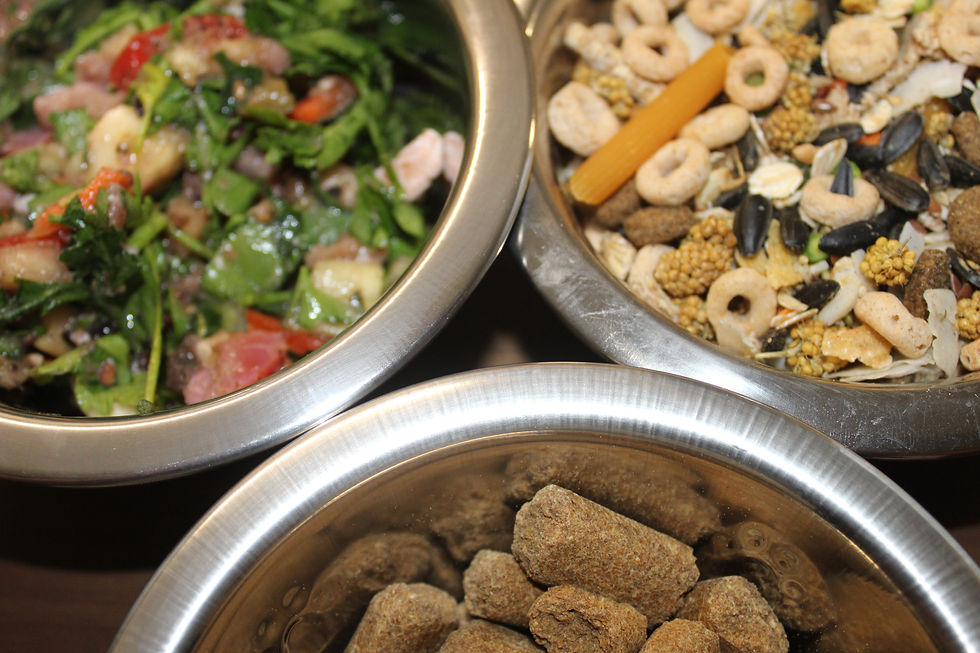How to Meet Your Pet Rat's Dietary Needs for Optimal Health and Thriving
- StormHaven Rattery

- Jun 10, 2025
- 3 min read
Updated: Jan 24

Rats are wonderfully social and intelligent pets, and providing them with the right diet is crucial for their overall health and well-being. Understanding your pet rat's dietary needs will empower you to create a balanced meal plan that promotes longevity and vitality. This blog post will delve into the essential components of a rat diet, the specific nutrients required, and practical tips for ensuring your furry friends thrive.
Understanding Nutritional Requirements
A proper understanding of a rat's nutritional needs is vital. Rats are omnivores, which means their diet must include a mix of protein, carbohydrates, fats, vitamins, and minerals.
First and foremost, barring any medical conditions, the core of a pet rat's diet should be comprised of high-quality rat pellets. These pellets are specially formulated to meet the specific growth and health needs of domestic rats. They contain essential nutrients in a balanced mix, making them a crucial component of a rat's daily meal.
In addition to pellets, fresh foods can greatly benefit a rat’s health. Fresh fruits and vegetables provide vitamins and hydration and should be given in moderation. Remember to introduce new foods gradually and monitor for any adverse reactions.
Essential Nutrients for Rats
Protein
Protein is essential for muscle growth and repair in rats. During their growth phase, young rats especially require a protein-rich diet. Good sources include boiled eggs, cooked chicken, and some legumes. Offering a variety will ensure that your rats receive a well-rounded intake of nutrients.
Carbohydrates
Carbohydrates provide the energy rats need for their playful antics. Whole grains such as oats, brown rice, and whole wheat bread can be excellent choices. These foods provide sustained energy and contribute to digestive health due to their fiber content.
Fats
While fats are an important energy source, they should be given sparingly. Healthy fat sources include small amounts of nuts and seeds, but it’s essential to avoid fatty or salty snacks. Too much fat can lead to obesity and other health issues in rats.
Fresh Fruits and Vegetables: The Extras
Fresh fruits and vegetables can enhance your rat's diet significantly. However, ensure you wash them thoroughly and chop them into small, manageable pieces. Some beneficial additions include:
Broccoli: Rich in vitamins and minerals.
Blueberries: Great for antioxidants and delicious for rats.
Carrots: Provide vitamins and are crunchy, helping with dental health.
Always remember that some foods can be harmful to rats. Avoid citrus fruits like oranges and lemons, as well as chocolate and processed foods. Research any new foods to ensure they're safe before incorporating them into your pet’s diet.
Treats and Snacks
You may be tempted to spoil your pet rat with treats, but moderation is key. Small amounts of dried fruits, such as banana chips, can be rewarding when training your rat. You can also create homemade treats using safe ingredients, ensuring they are healthy and free from unhealthy additives.
Keeping Hydrated
Just like humans, rats require access to clean, fresh water. It is vital to provide continuous access to water, as dehydration can quickly lead to serious health issues. Use a bottle or a heavy bowl to prevent spills and ensure your pet has uninterrupted access throughout the day.
Signs of a Balanced Diet
Monitoring your rat’s health is crucial. Signs you have a well-balanced diet for your pet include:
Healthy coat: A shiny, supple fur coat indicates good nutrition.
Energetic behavior: Active and playful behavior suggests your rat is feeling their best.
Normal weight: Keeping an eye on your rat's weight will help prevent obesity and other health issues.
Common Dietary Mistakes to Avoid
While feeding your pet rat, it's easy to make some common dietary mistakes. Here are a few pitfalls to avoid:
Overfeeding: Too much food can lead to weight gain and health issues. Stick to recommended serving sizes.
Lack of Variety: A monotonous diet can lead to nutritional deficiencies. Offer a variety of foods to ensure all essential nutrients are present.
Ignoring Food Safety: Always ensure that any food given is safe for rats. Do thorough research on foods that are toxic or harmful.
Conclusion
Caring for your pet rat includes a commitment to providing a balanced diet tailored to their specific needs. By understanding the essential nutrients they require and incorporating a variety of foods, you can ensure your pet rat lives a long, healthy, and thriving life. Regularly assess their health and behavior to make adjustments to their diet where necessary. Your furry companions will surely show their appreciation with love, affection, and playful antics in return!
By following these guidelines, you’ll not only meet your pet rat's dietary needs but also develop a deeper bond through the care you provide. Remember, a well-fed rat is a happy rat!


Comments